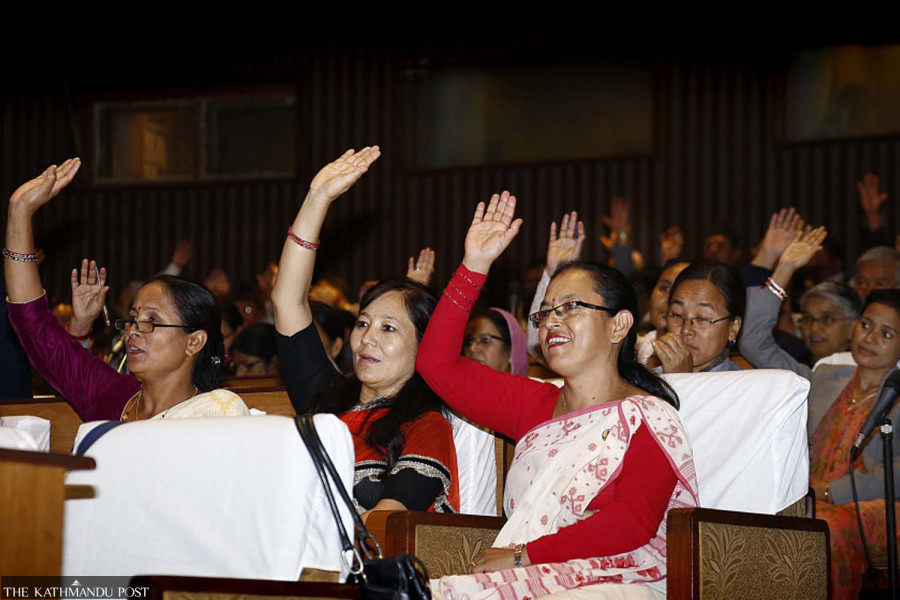National
Voters favour women, party leaders don’t
Selection of candidates is based on whims of male politicians as women are under-represented in top party committees.
Aakriti Ghimire
Let us start with a rather regrettable case study.
CPN-UML leader Binda Pandey was a Constituent Assembly member (2008-2012) and a member of parliament (2017-2022) under the proportional representation (PR) category.
After serving as a PR lawmaker twice, Pandey this time planned to contest direct election from a constituency.
During her stint as a member of the historic Constituent Assembly, she headed the committee for determining fundamental rights and directive principles that was one of the key bodies in the constitution drafting process.
The provisions on fundamental rights and duties enshrined in the current constitution are hailed not only in Nepal but internationally too. They were included in the charter based on the report prepared by the Pandey-led committee.
She returned to the legislature as a lawmaker in 2017 again under the PR system.
As the country is headed for federal and provincial elections scheduled for November 20, this time she planned to get elected through direct election. She expressed her desire to the party leadership and told them that she wanted to contest from Kathmandu constituency 2.
As per the party’s general rule, she needed to be nominated from the party chapter of the respective constituency. She threw her hat into the ring. But the local party committee didn't include her name in the list of leaders recommended to the party's central selection committee. As of now, she is out of the preliminary selection process. She may not be able to contest direct election unless the central leadership makes an exception for her case.
She also planned to be elected to the party’s top body. So she prepared for an election for an office-bearer position in her party when the party organised its general convention in Chitwan last year.
But party chair KP Sharma Oli and his team didn't want to elect leadership through direct voting by party representatives. They instead wanted to pick the leadership “by consensus” with a calculated plan to prepare a team that would be comfortable for Oli.
Then, all those aspirants for any leadership post needed to approach Oli or other leaders trusted by him to find a place on the list. Pandey sought support from party members but didn't meet Oli personally to request him to include her.
The UML has always remained divided along factional lines. Pandey herself always supported the Oli-led faction on key political issues. But she publicly criticised the practice of encircling party bosses for a post and announced she wouldn't go to the party chair to make any such request. Oli's team didn't include her in its list of candidates. So her plan to become a deputy general secretary or secretary failed.
Later, the party nominated her as a standing committee member.
Pandey, who has a PhD in women’s rights and has authored a book titled ‘Women in Nepali Politics’, among other publications, is regarded as a critical and bold voice among the party rank and file.
When top politicians are criticised for not giving sufficient space to women in key decision making bodies, they often argue they don't find women representatives who are both qualified and eager to take up challenges and responsibilities.
Pandey's case suggests they are wrong.
Women representatives now cite Pandey’s case as an example that represents many competent women in Nepali politics, who don’t easily get opportunities to take up decisive positions.
“While the possible candidates’ names were being decided, I was not informed about the meeting. The next day, I came to know through the media that they recommended a single name as a candidate from the constituency,” said Pandey.
“This happened despite a clear instruction from the Central Committee (CC) to the local chapters to recommend three names, including at least one woman.”
As a general practice, Pandey was supposed to be informed about the meeting. She wasn’t.
Incidents like these have raised questions about the selection process of the parties fielding candidates for the upcoming federal and provincial elections.
UML party members said the selection is often based on the whims of a handful of political leaders of the respective committees. Despite the public willingness to vote for women in elections, as demonstrated by their good performance in the local elections, political parties are preventing women from rising up the political ladder, they said.
“Whoever swarms around the leadership like bees are nominated. Previously, there was a set of rules in the party mandate which used to be largely followed during the candidate selection process. But these days, those rules are just for show,” said Ushakiran Timsena, central committee member of the CPN-UML. “Society has trusted women as leaders. It is the political parties that still don’t accept them as leaders.”
Pandey has been a voter of the Kathmandu-2 constituency since 1999 and she doesn’t plan on contesting from any other constituency.
In the 2022 local elections, while women made up 37.84 percent of the total candidates, they won 41.21 percent of the seats.
Among the notable women winners in 2022 were Renu Dahal and Mina Kumari Lama. While Dahal defeated strong male candidates in the race for Bharatpur mayor, in Hetauda sub-metropolitan city, Lama emerged victorious in the contest for the top post. Likewise, in Kathmandu's deputy mayor race, Sunita Dangol defeated her closest rival, a male candidate, by a huge margin of 44,806 votes.
Despite the sidelining of women by political parties, thanks in part to a politics of alliance, women’s wins are evidence that voters trust them as leaders, as Timsena put it.
However, political parties have failed to take note of the voters’ sentiments, as they continue to limit women to under 33 percent representation, the majority of which is under the PR category, and thereby limit their access to power and resources.
By not allowing women to contest directly, women’s political leadership and personality cannot be established in the public eye. In addition, those under the PR system, the majority of whom are women, have also been denied access to development funds, further curtailing their powers in parliament. This fund helps establish a leader in their constituency.
Lawmakers elected directly by the people’s vote—more than 95 percent of whom are men—hold dominant power, resources and influence.
In each of the past elections following the 1990 political changes, less than five percent of women have been elected from the first-past-the-post system, according to election experts.
In the 1991 parliamentary elections, of the 205 members, seven women lawmakers were directly elected. The number reached 12 out of 205 members in the 1999 elections and 7 of 275 members in the 2017 elections.
Political watchers aren’t optimistic about the results of the upcoming elections as well.
Khimlal Devkota, politburo member of the CPN (Maoist Centre), doesn’t see major parties fielding many women candidates under the FPTP category. He says: “The probability of women contesting under FPTP is very low this time.”
Research by the Asia Foundation, an international nonprofit, says a lack of internal democracy, central-level intervention in the selection of candidates and the dominance of men in key internal posts have largely curtailed women’s access to decision-making positions.
“Women fully dedicated to the party were nominated for deputy positions in the local elections while men who only spent part-time to party work were picked for higher positions of power,” said Sumina Karki, one of the contributors to the report.
The candidate selection process of each political party varies, on paper. In practice, it all boils down to whom the senior politicians favour.
In the UML, the party secretariat, a top body comprising the party’s office bearers, is mandated to finalise the list of PR candidates based on the recommendations made by lower district and provincial chapters.
However, the women leaders The Post spoke to said the entire democratic process is limited on paper, and only those who are favoured by the party’s influential leaders make it to the final list.
Of the 20 members in the UML secretariat, only two are women. So their say can hardly be decisive in candidate selection.
Timsena thinks that the presence of female leaders in such a body doesn’t make much of a difference.
“It is unfair to hold only the senior female leaders accountable for failing to include more women in the list. The male politicians are as accountable,” Timsena argued. “The decision-making process of the entire party should be questioned.”
Likewise, in Nepali Congress, a parliamentary board is authorised to finalise the list of candidates. The parliamentary board has a total of 25 members, including the party president, vice-presidents, treasurer and a few members selected by the president.
Similar to the whims of the CPN-UML leaders, Nepali Congress’ nominations follow a similar strategy, say party officials.
“This time Prime Minister Sher Bahadur Deuba, who is also the party president, has included only 13 members on the board. Eleven positions on the parliamentary board are still empty,” said Shankar Tiwari of the Nepali Congress. “Only one female leader represents women in the powerful parliamentary board,”
Based on the past trends, Tiwari concludes that Deuba is not going to give full shape to the parliamentary board. And he isn’t quite optimistic about Deuba addressing the dissident groups’ concerns even if the issues are valid.
The scenario in the Maoist party is no different even though the former rebel party claims to be championing the agenda of inclusion.
Deputy General Secretary Pampha Bhusal is the only female leader in the 21-member office bearers of the Maoist party. The body takes most of the party’s key decisions. Afterwards, the decisions are presented in the central committee for endorsement, just as a formality.
Contrary to the spirit of the PR category ensuring the inclusion of marginalised community members in the decision-making process, many seasoned politicians of various parties have been nominated under the PR category by the parties on Monday.
Party leaders say that even when women may get tickets to contest in direct elections, it stems from the need to secure election of seasoned male politicians.
“There are many male leaders who need to be included under the PR system, particularly senior politicians. If women aren’t given tickets under direct elections, there won’t be space for those men in the PR category,” explained Tiwari.
Pandey is still hopeful about her candidacy. While many constituencies have recommended only one name, not following the CC decision of the CPN-UML, the central secretariat has the authority to make last-minute changes.
“Let’s wait and see how the apex decision-making body will do,” says Pandey.




 8.79°C Kathmandu
8.79°C Kathmandu















